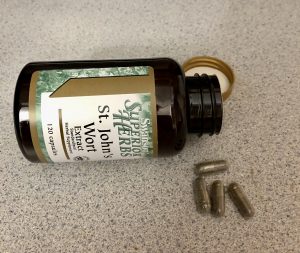St. John’s Wort is a plant- Hypericum perforatum. It grows in the wild and has bright yellow flowers that bloom around the time of St. John the Baptist’s birthday, June 24. “Wort” means plant in Old English, hence the name. It is native to Europe, but can grow anywhere there in dry, gravely soils, pastures, abandoned fields. It has been found in Africa, Eastern Canada and U.S.A, but also as far as California, Colorado, Arizona, and Australia. It is a very opportunistic plant and if not watched, can take over a garden quickly. In some places, St. John’s Wort is considered a weed.
Uses of St. John’s Wort
St. John’s Wort oil has been used for treatment of inflammation and skin eruptions and melanoma or non melanoma skin cancers. St. John’s Wort has been used in capsule form to treat OCD, PMS symptoms, and has been known to improve a woman’s mood and sexual well being during menopause. It is also used for treatment to improve the mood in seasonal affective disorder, and for smoking cessation. It’s antioxidant properties are said to promote good skin health. St. John’s Wort is used by many for treatment of mild to moderate depression. Many feel that it has fewer side effects than traditional antidepressants, and has been shown to have fewer dropouts in treatment. It is thought to work by increasing serotonin, dopamine, and norepinephrine availability in the brain.
Side Effects of St. John’s Wort
St. John’s Wort has some serious drug interactions. Taking it with other antidepressants can increase the levels of serotonin to a dangerous level. Symptoms of this can include agitation, diarrhea, fast heartbeat, high blood pressure, hallucinations, and increased body temperature.
St. John’s Wort can weaken some prescription medications including drugs to prevent rejection of transplanted organs,, Digoxin, Oxycodone, some HIV drugs, some cancer medications, birth control pills, and blood thinners. Some people have shown increased sensitivity to the sun, allergic reactions, upset stomach, dry mouth, headache, dizziness and confusion. Some people have reported symptoms of fatigue and restlessness with long term use. It may increase symptoms of ADHD, Alzheimer’s Disease, and an increase in psychotic symptoms in bipolar disease of schizophrenia.
It should not be used during pregnancy.
Does It Work?
Most of the studies I reviewed for effectiveness in treating depression compared a traditional antidepressant, a placebo, and St. John’s Wort. While some studies showed little change in depression symptoms with St. John’s Wort, many of them showed similar results to treatment with traditional antidepressants over a placebo. Most people reported fewer side effects with St. John’s Wort. Some of the best results in studies came from Europe, and especially German speaking countries, where St. John’s Wort is used by medical professionals.
There are two chemicals thought to affect the levels of serotonin and dopamine. These are hyperforin, and hypericin. It is unclear which chemical is completely responsible for increasing these neurotransmitters, and different brands of St. John’s Wort may contain different amounts of each chemical, and therefor may not be as reliable as prescription antidepressants. St. John’s Wort is an anti-inflammatory drug, and there are some researchers that believe it is these anti-inflammatory properties that reduce depression and other mood disorders.
Some physicians still believe that traditional antidepressants are more effective than St. John’s Wort due to drug interaction and questions regarding dosages and exact composition of each brand of capsule. However, many people feel it works about as well as prescription antidepressants.
Conclusion
You should talk to your doctor about any mediation, traditional or herbal, that you take, especially before surgery, or adding a new medication to your regimen.
St John’s Wort may be an effective treatment for mild to moderate depression and some other mood disorders.
References
National Center for Complimentary and Integrative Health
Very Well Mind
Web MD
Cleveland Clinic
DrAxe.com
EdibleFood.com
ScienceBasedMedicine.org
Blessings and Peace,
Jill


No comments:
Post a Comment